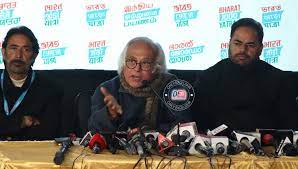SRINAGAR: Senior Congress leader Jairam Ramesh on Saturday said he never thought former party leader Ghulam Nabi Azad would turn out to be a “Mir Jafar” and alleged that he had been propped up by the BJP to cut the Congress’ votes in Jammu and Kashmir.
Speaking with reporters, during the Bharat Jodo Yatra that is in its final leg in Kashmir and is set to conclude on January 31, Ramesh said the most important thing right now is that Jammu and Kashmir’s statehood be restored and elections be held besides bringing in Ladakh under Schedule VI of the Constitution so that it is governed by elected representatives and not bureaucrats.
He listed Democratic Azad Party (DAP) chief and former Congress leader Ghulam Nabi Azad as part of BJP’s plan to divide votes with others in the list being All India Majlis-e-Ittehadul Muslimeen’s Asaduddin Owaisi and the Aam Admi Party (AAP).
“His going from the Congress was part of a Modi-Shah game plan to cut votes. There are three vote-cutters in India – Asaduddin Owaisi put up by the BJP, AAP put up by the BJP and Azad put up in J-K to cut Congress’ votes. I do not think it is going to happen,” Ramesh said.
On whether Azad would dent the Congress’ prospects with his DAP, Ramesh pointed out that most Congress workers and leaders who left with Azad have returned to the party fold.
Asked if Azad can ever make a comeback into the Congress like some of his newly formed party colleagues have, Ramesh said, “I have no idea what Mr. Azad’s plans are. I never imagined in my wildest dreams that he would actually abandon the Congress. It is the party that gave him identity for almost 50 years, gave him every conceivable position in the party and in the government, including Chief Minister, Union Minister, Leader of Opposition, but I never thought he would be Mir Jafar, never.”
Mir Jafar served as the commander of the Bengal army under Siraj-ud-Daulah, the Nawab of Bengal, and betrayed him during the Battle of Plassey, paving the way for British rule in India.
Admitting that he was never a close associate of Azad, the Congress General Secretary said he still “cannot reconcile with the manner of his leaving, the letter that he wrote diminished him in the eyes of every Congress person, particularly after getting all the benefits from the Congress in the last 50 years.”
Asked how he sees the revocation of Jammu and Kashmir’s special status and its impact, Ramesh pointed to the Congress resolution of August 6, 2019, and said the party wants restoration of the democratic process, restoration of full-statehood and Ladakh to get its Schedule VI status in the Constitution and not be a Union Territory governed by bureaucrats getting orders from New Delhi.
“So, it is a long drawn out process. But I do want to say that one should not forget that the Indian Constitution has Article 371 A-J, which has special provisions for Nagaland, Sikkim, Goa Arunachal Pradesh, parts of Assam. Indeed, Article 371 has special provisions for parts of Gujarat, Maharashtra and Karnataka. So those who criticise Article 370 should also look at Article 371,” Ramesh said.
In 2019, Article 370, which granted special status to Jammu and Kashmir, was abrogated and the erstwhile state was bifurcated into union territories of Jammu and Kashmir and Ladakh.
The Congress General Secretary alleged that the claims of normalcy in Jammu and Kashmir are “largely exaggerated because targeted killings are continuing, not only in Kashmir but also in Jammu, Poonch Rajouri, and across J&K”.
The figures of investment or economic boom are only “paper figures”, Ramesh alleged.
“The underlying sentiment of resentment, now that resentment is not just in Kashmir, that resentment is also in Jammu which I have discovered and also in other parts particularly on matters related to land. Because the biggest fear whether you are living in Jammu or in Kashmir, is of lands, jobs,” he said.
There must be some special provision for protecting the land and job rights of people in Jammu and Kashmir which Article 370 did in a way, Ramesh added.
“The most important thing is to make J&K a full-fledged state, have elections here and bring Ladakh under Schedule VI. Difference between schedule VI and a UT (Union Territory) is that elected representatives manage affairs under Schedule VI and in UT, a joint secretary in the ministry of home affairs runs the UT,” he said.
Ramesh’s remarks come days after a host of DAP’s founding members returned to the Congress fold.
Azad had snapped ties with the Congress last year after an over five-decade association with the party and written a long resignation letter, slamming the party’s top leadership.


